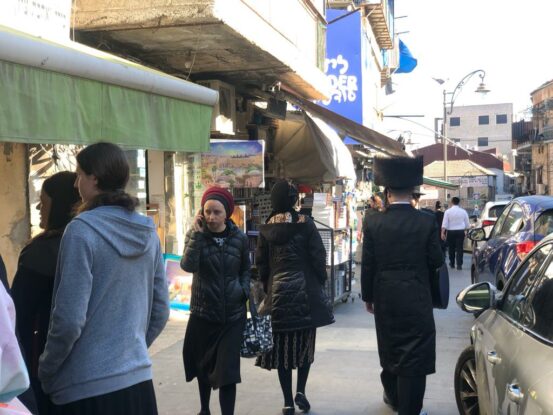A new government was launched last week, in which all the key positions in the housing sector were appointed to ultra-Orthodox or right-wing nationalist representatives. The first published coalition agreement between the Likud and Torah Judaism includes a series of clauses that benefits the ultra-Orthodox population and that may delay the construction of the Gush Dan metro network.
Just before the end of 2022, the Knesset received the confidence of a right-wing government headed by Benjamin Netanyahu. This is the most right-wing and religious government ever formed in Israel, and more than half of the members of the coalition on which it relies are religious Knesset members. A large number of the most relevant positions in the government, including the housing sector, are filled by ultra-Orthodox or national religious ministers.
Appointed to the position of Minister of Construction and Housing was Yisrael Yitzhak Goldknopf, chairman of Agudat Yisrael and a member of the Gur Hasidic community who until recently managed a number of Haredi educational institutions, Shas chairman Aryeh Deri was appointed as Minister of the Interior, and chairman of the right-wing, Religious Zionism party, Bezalel Smotrich was appointed as Minister of Finance. Moshe Gafni, chairman of the Flag of the Torah (which is united with Agudat Yisrael in a joint list – Yehudit HaTorah) was appointed to head of the Finance Committee, which is deeply involved in all matters related to the allocation of budgets and legislation on taxation.
According to assessments, the structure of the new government, and in particular the identity of those appointed to the relevant ministries in the field of housing, is expected to lead to two significant changes in the current housing policy: Firstly, the provision of targeted assistance, in the area of housing, to the ultra-Orthodox population, most of whom are underprivileged. Secondly, a significant increase in the scope of construction in Judea and Samaria relative to the current status. The implementation of this clause is liable to put the new government on a collision course with the US administration, and it will be interesting to see how Prime Minister Netanyahu maneuvers between his commitments to the coalition members and the political pressures.
As of this writing, only one coalition agreement has been published in full – the agreement between the Likud party and Yahadut HaTorah, headed by Housing Minister Goldknopf and Finance Committee Chairman Gafni. The agreement includes many clauses that deal directly with housing, as well as a number of clauses that may affect housing indirectly – such as ensuring the right to ground burial, a move that could affect the supply of land available for construction.
The housing clauses in the agreement can be divided into two types: those relating to the entire population and those that seek to take care specifically of the Haredi interest.
Clauses relating to the general population:
1. Urban renewal in the periphery
The clause sets forth the allocation of hundreds of millions of shekels to promote urban renewal in the periphery, in areas where it is not currently economically feasible to carry out projects. This is an issue that concerns the Ministry of Construction and Housing and the Urban Renewal Authority, on which the conclusions of an inter-ministerial committee that acted on the subject were recently published, indicating that in order to realize projects in these areas, each existing apartment must be subsidized by hundreds of thousands of shekels.
2. Increase supply of homes through local incentivization
The agreement includes a move initiated by the previous government, but which was not implemented, to incentivize local authorities to approve residential construction in their areas in order to increase the supply of homes. According to the previous initiative, there would be a grant of NIS 30,000 for each housing unit approved by the authority. The agreement currently does not specify the scope of the budget.
3. Subsidized loans for long-term rental developments
The agreement stipulates that a subsidized loan fund will be established for developers in order to encourage construction for long-term rental, at an interest rate of 1% per annum without linkage, with a budget of NIS 50 million per year.
Clauses that apply specifically to the Haredi sectors:
1. A new Haredi city
One of the most prominent clauses in the agreement is a commitment to establish a new ultra-Orthodox city, the location of which will be decided within 90 days of the establishment of the government. It should be noted that the practice of establishing Ultra-Orthodox cities is controversial since the capability of their residents to integrate into economic life is severely limited, however, the establishment of Ultra-Orthodox neighborhoods in mixed cities is also considered problematic – primarily due to the opposition of non-Haredi residents.
2. National priority areas
It was agreed that the map of national priority areas, pinpointing where residents are entitled to tax benefits and other housing benefits, will be changed. Today, these areas include settlements in the geographic periphery, and it is assumed that the new government will add ultra-Orthodox cities to the list.
3. Anti-Discrimination Law
The agreement includes a commitment to amend the Anti-Discrimination Law to “enable the existence of residential communities on the basis of religion.” This means that it will be permissible to refuse to sell or rent an apartment to a tenant on the basis of religion, not only by private individuals but also by business companies. Currently, the law forbids limited liability companies from not selling apartments to buyers on the basis of religion or race and states that they may be exposed to lawsuits if they do so.
4. State subsidies in the periphery
Another issue is an initiative by former Housing Minister Yaakov Litzman that is now being revived, whereby those entitled according to the Ministry of Housing, who wish to purchase an apartment for less than NIS 700,000 in the periphery will receive a subsidy of NIS 100,000 from the state. It is estimated that a large proportion of those who take advantage of this benefit will be ultra-Orthodox households.
5. New appointments and influence
Finally, the agreement includes a plethora of appointments and positions in the new Israeli government. According to the agreement, the new minister may appoint 25 new employees to the Ministry of Housing. The agreement does not specify what those functions are, nor did its drafters see fit to determine the justification for doing so.
A more significant clause, in terms of the minister’s ability to influence land policy, allows the minister to appoint five public representatives to the Israel Lands Council, which is the board of directors that determines the policy of the Israel Land Authority, which manages 93% of the state’s land. The council currently includes 14 members, including the Minister of Housing, who also serves as chairman and another seven government representatives, and six representatives of the JNF.
Regarding the planning and building committees, which determine planning policy at the national, district, and local levels, the agreement states that representatives will be appointed “from all populations”, with the intention apparently being to integrate a greater number of ultra-Orthodox representatives into these institutions.
Other clauses in the coalition agreement relate specifically to the infrastructure sector, which is inextricably linked to the housing sector. Among other things, it was agreed that the Gush Dan metro route would be amended to reach Rosh Ha’Ayin and Elad in its eastern part. Although the expansion of the metro route may increase the number of its users and take more vehicles off the road, there is also a negative aspect to this – a delay in the start of the system’s activity, due to the need to approve a new route.
It should be noted that only a week before the inauguration of the new government in Israel, NTA – the company responsible for the construction of the Metro, announced that the first stage of the project is expected to start operating in 2034. The agreement may now jeopardize this deadline.
Now the question that will be asked during Goldknopf’s first months in office is what are the priorities of the new government when it comes to housing? Dealing with the housing crisis, or worrying about the housing shortage of the ultra-Orthodox public? Time will tell.








